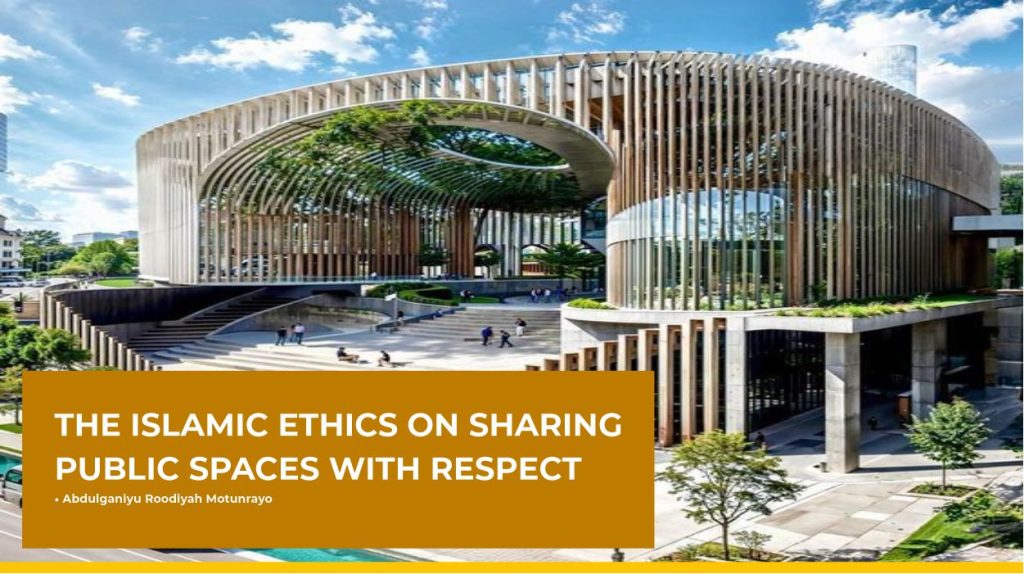Written by: Abdulganiyu Roodiyah Motunrayo
Sidewalks, masjid entrances, markets, buses, parks. As Muslim, how we behave in these spaces is part of our worship. Every step, every interaction, every glance can be an act of sin, a form of dawah, or a source of reward.
In a world that often prioritizes speed over courtesy and presence over purpose, Islam reminds us to be mindful, gentle and considerate, especially in the way we share spaces with others.
This post explore how Islam guides us to share public spaces respectfully, why it matters, principles to live by, examples from the prophet (peace be upon him), and gentle reminder for daily life.
Why it Matters
When you enter a street, mosque yard, market, or public gathering, you are stepping into other people’s space. Islam teaches that every step carries accountability. A hadith from the prophet (peace be upon him) reminds us:
“Beware of sitting in the roads”. They (the companions) said, “O messenger of Allah, we have no choice but to sit in them and talk.” He said, “If you must sit, then give the road its right”. They asked, “What is its right?” He said: “Lowering the gaze, refraning from harm, returning greeting, enjoining good, and forbidding evil.” (Sahih Al-Bukhari, 6229).
This hadith shows that even in public spaces, we have responsibilities. When we ignore them, we do not only harm others, we also weaken the moral fabric of society.
Public spaces are arenas of worship too: a place to show character, kindness, and the beauty of Islam in our daily lives.
Five Principles For Public Spaces
1. Lower The Gaze:
In crowded areas, it is easy to glance too long or stare, but Islam calls us to modesty regarding the eyes. Allah instructs:
“Tell the believing men to lower their gaze and guard their private parts. That is purer for them. Indeed, Allah is acquainted with what they do” ( Surah An-Nur, verse 30).
By guarding our gaze, we protect our hearts, reduce discomfort for others, and preserve the dignity of all involved.
2. Refraining from haram:
Our presence should never inconvenience others. This includes blocking paths, littering, loud noise or pushing. The prophet (peace be upon him) said:
“Removing harmful things from road is a charity” (Sahih Muslim, 1009).
Even small acts like picking up trash, stepping aside, and lowering one’s voice reflect good character.
3. Return the Tesleem:
If someone greets you with ‘As-Salaamu Alaykum’, respond with ‘walaykum as-Salaam’ or a greater greeting. Allah says:
“And when you are greeted with a greeting, greet with one better than it or return it( in a like manner). Surely Allah is ever an Accountant over all things” (Surah An-Nisa, verse 86).
As-Salaamu alaykum is a bridge of peace. It soften hearts, renew bonds, and spreads blessing.
4. Enjoin good & forbid evil:
If you see something unjust or harmful, with wisdom and gentleness, encourage correction. Allah tells us:
“You are the best nation produced (as an example) for mankind. You enjoin what is right and forbid what is wrong and believing in Allah. If only the people of the scripture had believed, it would have been better for them. Among them are believers, but most of them are defiantly disobedient” (Surah Aal-’imran, verse 110).
We don’t turn away from wrongdoing. We address it with respect, not arrogance.
5. Respect modesty and space
Don’t overstep your bounds. In prayer line, queues, and public seats, be considerate. Don’t push or lean on others. Keep your distance. Let others feel welcome, not crowded.
Scenarios & How To Apply:
• Crossing paths:
You’re walking and you meet someone coming opposite way. Step slightly aside, lower your gaze, make tasleem, and smile. Simple gesture communicates respect.
• Bus or shared ride:
If there’s only one seat left, offer it to elders, women, and the vulnerable ones. Keep your voice moderate. Avoid loud calls or audio players.
• In the Marketplace:
Don’t block aisles. If you stop to examine something, step aside. Keep transaction brief, polite, and courteous.
• Mosques & Gatherings:
Remove shoes carefully (don’t drag). Avoid chatting loudly. Maintain humility, even in large crowds.
Why it transforms us Manners in public polish the soul. If your character is good when no one watches, you are living Islam truly. Every footstep, glance and greeting, are form of ‘ibadah when done with the right intention.
Imagine a world where Muslims carry gentleness, respect, and kindness into every public place. That’s the legacy we hope to build.
Teaching Children & Building Habits
This adab should be thought early. Children should know that littering is not just messy, it is sinful. That raising your voice in public is discouraged. That saying ‘As-Salamu Alaykum’ is a sunnah not to be skipped.
Building public manners at home leads to respectful adults in society.
Final Thoughts & Du’aa
Public manner is not about perfection. It is about mindfulness. It is about choosing character over chaos, patience over pressure, and peace over pride. It is knowing Allah sees you on the street just as much as He sees you in sujūd.
Every shared space is a test, a trust, and a change to prove the beauty of Islam through the smallest acts. May Allah grant us wisdom
to adorn every step with respect. May He make us a good template of ethics in our families, communities, and public life. Aameen.


